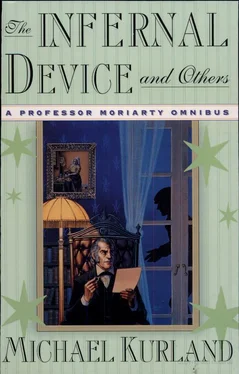"What about eating?" Barnett asked.
"I would say he eats as an animal eats," Cecily said. "He ingests food to give him the necessary energy to keep going. I doubt if he cares what he eats, or is even aware what the dish in front of him contains."
"And upon what do you base this stark image of a man driven by forces stronger than himself?"
"On my study of similar crimes committed in the recent past," Cecily said. "The Düsseldorf Slasher of fifteen years ago was a man named Roehm. When the police apprehended him he was living in a bare, unfurnished room with only a couple of blankets on the floor to sleep on. The only clothing he possessed was several changes of undergarments and one extra shirt. And this was a formerly respectable, middle-class man."
"Who was he killing," Barnett asked, "and why?"
"He killed three magistrates, two clerks of the court, two bailiffs, and a man that drove the prison wagon before he was captured."
"He must have had it in for the courts."
"His wife was arrested and convicted of a homicide and sentenced to the mines. Three years later it was discovered that she was innocent, and she was released. It was too late; the hard labor and terrible conditions at the mines had weakened her until she was beyond medical help. The state gave her thirty gold marks for recompense. She died six months later. A year after that the murders began."
"I'd say the man had a just grievance," Barnett commented. "Imagine what emotions must have been bottled up inside of him. It's not surprising that they came out as a series of slashings."
"He was certainly acting under the influence of a powerful compulsion," Cecily agreed. "As was the Mad Bomber of Paris in 1878, who went around leaving infernal devices in the left-luggage rooms of railway stations. As was Mr. Pinkley of Chicago, who made it his practice to give bonbons laced with arsenic to ladies of the street."
The soufflés were delivered at this moment, and Barnett stared down at his. It was very attractive, rising a full three inches off the top of the dish. "Arsenic, eh?" he said.
Cecily laughed. "Don't worry," she told him. "I've heard of its being sprinkled into omelets, but never a soufflé."
Barnett looked up and grinned at her. "You can't be too careful," he said.
"So I've been led to believe," Cecily said.
They ate their desserts in contemplative silence. The time, Barnett realized, had come. He took a deep breath. "Cecily," he said, "there is something I'd like to ask you."
"Yes, Benjamin?"
He took another deep breath. "I, ah, would like to ask your father for your hand in marriage."
Cecily put her fork down carefully on the side of the plate and nudged it with her finger until it was in the perfect position. The silence stretched on.
"Say something, Cecily," Barnett finally blurted out.
For another long moment there was no response. Cecily's eyes darted around as though she felt trapped at the table and was looking desperately for a way out. Then she turned to Barnett and pointed a finger at him. "I'm certain you don't realize this," she said, "but that proves my point, what you just said. It's so typical. And you're not even aware of what you did."
"What do you mean, 'not aware'?" Barnett demanded, his voice cracking slightly with the effort to suppress both his anger and his bewilderment at this reaction. "I just proposed marriage to you, that's what happened."
"No, it isn't," she said. "You just informed me that you were going to ask my father. Is it my father that you wish to marry? If not, then why are you going to ask him?"
This, Barnett decided, was not his day. Perhaps there was something to astrology after all. "It is the custom," he said. "What I'm actually doing is asking you, you know that. But your father has to give you away."
"Why?" she asked. "Supposing Father says no?"
"I, ah, hadn't thought of that," Barnett said. "Frankly, if you say yes, I don't give a damn what your father says."
"That is courageous of you," she said.
Barnett dropped his fork onto his plate with a little silver clatter. "All right!" he said. "I'm not asking your father, I'm asking you. Cecily, will you marry me?"
"I don't know," she said.
"What?"
Cecily leaned forward and took his hand. "I would like to marry you," she told him. "But I'm not sure you'd really like to be married to the sort of wife I'd be."
"Cecily, I love you," Barnett said. "This table's too wide for me to hold you properly, but I love you more than anything and I want you to be my wife. I know that's trite, but there it is. I have loved you for some time. Since the day you first knocked on the door of the American News Service, as a matter of fact."
"It took you long enough to get around to declaring it," she said.
"I had commitments," Barnett said. "There were reasons."
"No, never mind that," she said. "That was unfair of me. I've been aware for some time of how you feel about me. And I'm honored."
"Honored," Barnett said. "Which means that you don't love me."
"No, it doesn't," Cecily said. "Benjamin, dearest, I do love you. I even wish to marry you, I just don't think you really want to marry me."
"With all my heart," Barnett said. "You want me to be your wife."
"Yes."
"You want to set up a home for me."
" With you."
"You want me to quit work."
"Of course."
"Well, I want to marry you, Benjamin, but I have no desire to give up my career. I want to be a reporter. I don't want to just sit home and tend the babies — if we have any babies."
"Why not?" Benjamin asked. "What's wrong with tending babies?"
"I'll tell you what," Cecily said. "I'll keep my job and you stay home and tend the babies."
"Cecily!" Benjamin said, sounding positively shocked.
"Those are my terms," Cecily said. "Have you a counter offer?"
"Don't be ridiculous," Barnett said.
"You think it's ridiculous, do you?" Cecily demanded. "All my life I've wanted to be a reporter. And now, when I've just begun to make it, when I'm doing a series that's picked up by our whole list, when I've been offered a job in the city room of the Chronicle, you think I should give it up just because you happen to love me and I happen to love you. Well, I tell you, Mr. Barnett, it won't wash. It just won't wash!"
"You love me?" Barnett said.
"Of course I love you," Cecily replied. "What do you think I've been telling you?"
"Oh," he said. "But — now let me see if I understand this correctly — you don't want to marry me because then you'd have to stay at home and tend the babies, if we had any babies, rather than being free to pursue your career as a journalist."
"That's right," Cecily said. "Although you make it sound horrible. What is so wrong with a woman's wanting to do something with her life?"
"I, ah, don't know," Barnett confessed. "I've never given it much thought. I mean, basically I see nothing wrong with it at all. I think women should certainly be as free as men to do — most things. But when I think of my wife, I must confess that I picture her at home running the household while I battle the outside world."
"I agree it is a lovely image," Cecily said. "And there are undoubtedly many women who would dearly love to occupy the position you imagine. Which is why I think that although I might love you, we should not marry. It would be stifling to me and dreadfully unfair to you. I must be free, Benjamin, to take advantage of whatever life has to offer!"
"Well," Benjamin said, "if you must…" He stared into his coffee. "I will admit that I have not given much actual thought to what I want or need from a wife. What I have is mostly half-formed images involving you and me sitting around a fire and holding each other in various, ah, postures."
Читать дальше












